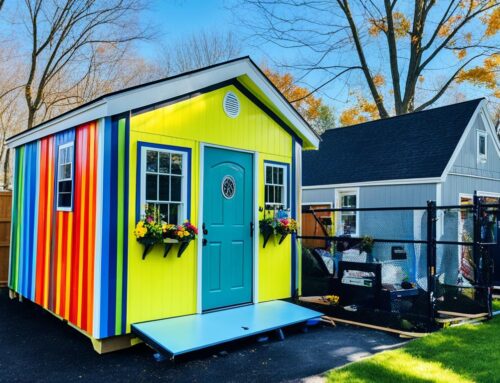Our rapid process and expert guidance at TracisPermits.com make us unparalleled in Suffolk County for securing building permits on Long Island. For hassle-free permit solutions, call us at 631-492-0927.
Key Takeaways:
- Securing building permits in the Village of East Hampton is essential for compliance with building codes and regulations.
- The East Hampton (village) Building Department administers and enforces the New York State Uniform Fire Prevention and Building Code.
- Code Enforcement Officers play a vital role in reviewing permit applications, conducting inspections, and ensuring compliance with building laws.
- Noncompliance with building permits can result in legal fines and put the integrity and safety of structures at risk.
- Before starting a renovation in the Hamptons, it is crucial to determine the specific permits required for your project and seek the necessary approvals.
Understanding the Applicability and Establishment of the Department of Code Enforcement
The Village of East Hampton recognizes the importance of adhering to the New York State Uniform Fire Prevention and Building Code. To ensure compliance with these regulations, the village has established the Department of Code Enforcement. This department plays a critical role in administering and enforcing the building code within the village.
Under the authority of the Village Board, the Department of Code Enforcement appoints Code Enforcement Officers. These officers handle various responsibilities, including receiving permit applications and issuing permits for construction, alteration, and demolition activities. Additionally, they have the power to inspect premises and issue notices or orders to ensure that buildings and structures comply with the necessary regulations.
The establishment of the Department of Code Enforcement in the Village of East Hampton demonstrates the village’s commitment to maintaining safe and compliant structures. By enforcing the New York State Uniform Fire Prevention and Building Code, the department helps safeguard the integrity of the properties and promotes the overall safety of the community.
The Role of Code Enforcement Officers
Code Enforcement Officers in East Hampton hold significant responsibilities in upholding building codes and regulations. Their duties include reviewing permit applications, issuing permits for construction, alteration, and demolition, and conducting inspections to ensure compliance with building laws.
In addition to enforcing the requirements of the building code, Code Enforcement Officers have the authority to issue notices or orders to address any illegal or unsafe conditions. They are also responsible for issuing appearance tickets for violations and approving design modifications and accessibility improvements to buildings.
Working Towards Compliance and Building Safety
The Department of Code Enforcement, along with the Code Enforcement Officers, plays a crucial role in maintaining the standards for construction and building safety in the Village of East Hampton. By ensuring compliance with the New York State Uniform Fire Prevention and Building Code, they contribute to the overall well-being and protection of the community.
| Responsibilities of Code Enforcement Officers | Authority of Code Enforcement Officers |
|---|---|
| Reviewing permit applications | Issuing notices or orders for compliance |
| Issuing permits for construction, alteration, and demolition | Enforcing the requirements of the building code |
| Conducting inspections | Issuing appearance tickets for violations |
| Approving design modifications and accessibility improvements |
Duties and Powers of Code Enforcement Officers in East Hampton
Code Enforcement Officers in East Hampton play a critical role in administering and enforcing building codes and regulations within the village. With their expertise and authority, they ensure that construction activities adhere to the necessary standards, promoting safety and compliance throughout the community.
One of the primary responsibilities of Code Enforcement Officers is the review and approval of building permit applications. They carefully assess each application, considering factors such as structural integrity and compliance with fire prevention measures. Once deemed satisfactory, they issue permits for various construction, alteration, and demolition projects, allowing them to move forward legally.
Code Enforcement Officers also conduct inspections to verify that the work being carried out aligns with approved permits and meets all relevant building codes. These inspections help identify any potential violations and ensure that construction activities proceed according to the established guidelines.
In cases where noncompliance or safety hazards are discovered, Code Enforcement Officers have the authority to issue notices or orders to address the issues promptly. They can require the removal of illegal or unsafe conditions and ensure that the necessary corrections are made to bring the structure into compliance with the building code.
Furthermore, Code Enforcement Officers have the power to issue appearance tickets for violations, helping to enforce the regulations and hold individuals accountable for noncompliance. They also play a crucial role in reviewing design modifications and accessibility improvements to buildings, ensuring they meet the necessary standards.
In summary, Code Enforcement Officers in East Hampton have the duties and powers to:
- Review and approve building permit applications
- Conduct inspections to verify compliance with building codes
- Issue notices or orders to address noncompliance or safety hazards
- Enforce the regulations through the issuance of appearance tickets
- Review design modifications and accessibility improvements
Additional Resources
For a detailed breakdown of the duties and powers of Code Enforcement Officers, refer to the East Hampton Village Code Chapter 102-5. This document provides comprehensive information on the responsibilities and authority of Code Enforcement Officers in East Hampton.
Table: Code Enforcement Officer Duties and Powers
| Duties | Powers |
|---|---|
| Review and approve building permit applications | Issue permits for construction, alteration, and demolition projects |
| Conduct inspections to verify compliance with building codes | Issue notices or orders to address noncompliance or safety hazards |
| Enforce the regulations through the issuance of appearance tickets | |
| Review design modifications and accessibility improvements |
Importance of Building Permits and Consequences of Noncompliance
When embarking on a construction, renovation, or demolition project in East Hampton, obtaining the necessary building permits is not just a formality but a legal requirement. Failure to apply for and obtain the proper permits can have severe consequences, including significant fines and legal penalties. Recent cases in East Hampton have highlighted the importance of compliance with building codes and the consequences of noncompliance.
“Obtaining the necessary permits is a crucial step in any construction or renovation project,” says John Smith, a building code expert. “The purpose of building permits is to ensure that the work being done meets safety standards and adheres to the applicable building codes.”
Building permits are essential for maintaining the integrity and safety of structures. They ensure that construction or renovation work is carried out by licensed professionals and in compliance with approved plans. Without proper permits, there is a risk of substandard work, which can lead to structural failures or safety hazards. Additionally, failure to comply with building codes can result in costly legal battles, reputation damage, and even the requirement to undo or redo the work.
In recent years, East Hampton has increased enforcement efforts to crack down on noncompliance. Individuals who have renovated without permits or violated building regulations have faced substantial fines. These fines not only serve as a deterrent but also help fund the enforcement efforts, ensuring that the community’s buildings and structures remain safe and up to code.
The Consequences of Noncompliance
Noncompliance with building codes can result in various consequences, including:
- Significant fines and penalties imposed by the building department or local municipality.
- Legal battles and court hearings, which can be time-consuming and costly.
- Damage to reputation and credibility, especially for contractors or builders.
- The requirement to undo or redo work that does not meet code requirements.
- Difficulty in selling or leasing a property that has noncompliant structures.
- Risk of injury or harm to occupants or visitors due to unsafe conditions.
To avoid these consequences, it is imperative to consult with the Department of Code Enforcement and obtain the necessary building permits before commencing any construction, renovation, or demolition work. Working with professionals who understand the permit process and building regulations can help streamline the process and ensure compliance with all requirements.
| Benefits of Obtaining Building Permits | Consequences of Noncompliance |
|---|---|
| Ensures compliance with safety standards and building codes | Significant fines and penalties |
| Protects the integrity and safety of structures | Legal battles and court hearings |
| Verifies that the work is done by licensed professionals | Reputation damage |
| Allows for proper inspections and approvals | Requirement to undo or redo work |
| Ensures compliance with approved plans | Difficulty in selling or leasing noncompliant properties |
By understanding the importance of building permits and the consequences of noncompliance, homeowners and contractors can ensure that their projects are carried out in a legal and safe manner. Compliance with building codes not only protects the community but also safeguards the investment and reputation of those involved in the construction process.
Determining Which Permits You Need for Your Renovation
When planning a renovation in the Hamptons, it is crucial to determine which permits you need for your project. Each Hamlet or village may have different building departments with specific residential codes. To ensure a smooth renovation process, it is recommended to visit your local building department and consult with the authorities to obtain a checklist of the required approvals and permits necessary for your specific renovation.
Different types of renovations may require specific permits. For example, if you plan on installing a fireplace, building a deck, or performing electrical and plumbing work, it is important to determine the specific permits needed for these activities. By understanding the requirements upfront, you can avoid unnecessary delays and ensure compliance with building codes.
Determining the Local Building Department
To determine the local building department for your renovation project, you can start by visiting the official website of the village or Hamlet where your property is located. The website will typically provide contact information for the building department, including phone numbers and email addresses. By reaching out to the local building department, you can inquire about the specific permits required for your renovation and obtain any necessary application forms.
It is essential to follow the instructions provided by the local building department and submit all required documentation and fees in a timely manner. Failing to do so may result in delays or even the rejection of your permit application. Working closely with the local building department will ensure that you have the correct permits and approvals in place, allowing your renovation to proceed smoothly and in compliance with building codes.
Remember, securing the necessary permits is not only a legal requirement but also ensures the safety and integrity of your renovation project. By obtaining the right permits and approvals, you can have peace of mind knowing that your project is being carried out in accordance with local regulations, protecting your investment and the quality of the workmanship.
| Renovation Type | Permit Required |
|---|---|
| Installing a fireplace | Yes |
| Building a deck | Yes |
| Performing electrical work | Yes |
| Performing plumbing work | Yes |
Additional Approvals Required for Renovations in Hamptons
When planning a renovation in the Hamptons, it’s important to be aware that beyond building and zoning permits, there may be other approvals required depending on your specific project. One common requirement is obtaining zoning permits, which ensure that your renovation project meets the local land use and development regulations. These permits are necessary to ensure that your renovation is in compliance with the village’s zoning laws and does not have a negative impact on the surrounding area.
Additionally, if your renovation project involves construction on tidal wetlands, you may need to obtain federal approvals. The N.Y District Army Corps of Engineers oversees the protection and preservation of tidal wetlands and may require you to complete federal applications. These approvals are necessary to ensure that your renovation project does not harm the habitat and overall health of the wetlands.
It’s important to note that obtaining these additional approvals can be a complex process, and it’s advisable to seek guidance from professionals who are familiar with the local regulations and requirements. They can assist you in navigating the necessary permits and applications, ensuring that your renovation project complies with all regulations and avoids any potential legal issues or delays.
| Required Approvals for Renovations in Hamptons | Permit Type |
|---|---|
| Zoning permits | Local regulatory approval |
| Federal approvals | N.Y District Army Corps of Engineers |
Ensuring that you have the necessary approvals for your renovation project is crucial to avoid potential legal complications and delays. Be sure to consult with professionals who can guide you through the process and help you obtain the required permits for your specific project.
By being proactive and obtaining all the required approvals, you can ensure that your renovation project proceeds smoothly and in compliance with all applicable regulations. This not only protects the environment and surrounding community but also helps maintain the integrity and value of your property. Remember, tackling the bureaucratic process of obtaining necessary permits is an essential step towards a successful renovation project in the Hamptons.
Conclusion
When embarking on a home renovation project in the Hamptons, it is essential to prioritize compliance with building codes and obtaining the required permits. By following these regulations and obtaining the necessary approvals from the local building department, you can ensure the success of your renovation.
At TracisPermits.com, we understand the importance of a streamlined permit process. Our expert guidance and rapid solutions make us the unparalleled choice for securing building permits on Long Island, specifically in Suffolk County. With our hassle-free approach, you can focus on bringing your renovation vision to life.
By obtaining the proper permits, you not only protect your investment but also ensure the safety and integrity of your structures. Avoid the risk of legal fines and delays by working with professionals who understand the permit process and regulations. For all your permit needs, call us at 631-492-0927 and experience the difference.
FAQ
Do I need a building permit for my renovation project in East Hampton?
Yes, obtaining a building permit is crucial for any construction, renovation, or demolition project in East Hampton. Failure to apply for the proper permits and obtain all necessary approvals can result in significant fines.
How can I determine which permits I need for my renovation in the Hamptons?
Each Hamlet or village may have different building departments with specific residential codes. Visiting your local building department will provide you with a checklist of the required approvals and permits necessary for your renovation.
Are there additional approvals required for renovations in the Hamptons?
Yes, in addition to building and zoning permits, there may be other approvals required for renovations in the Hamptons. If your property is located near the shore or on a tidal wetland, special approvals may be necessary. These approvals may be obtained from the N.Y District Army Corps of Engineers and may require variances.
What are the consequences of noncompliance with building codes in East Hampton?
Noncompliance with building codes not only leads to legal consequences but also puts the integrity and safety of the structures at risk. Recent cases in East Hampton have seen individuals ordered to pay fines for renovating without permits or violating building regulations.












